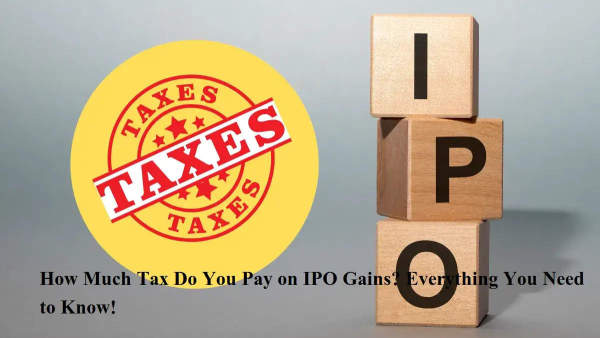
Tax Implications on IPO Profits – Know Before You Invest!
Investing in Initial Public Offerings (IPOs) has become a popular way to earn profits, especially when companies debut with strong listing gains. However, many investors are confused about whether these profits are taxable and, if so, how much tax they need to pay. Even if you do not fall under the income tax bracket, IPO earnings may still attract tax liability. Let’s break it down step by step.
The amount of tax you owe on IPO earnings depends on how long you hold the shares before selling them. If you sell your IPO shares within 12 months, a different tax rate applies compared to shares held for over a year.
Let’s assume you receive IPO allotment and make a profit of ₹12,000 in the financial year 2024-25 due to a strong listing gain. Your tax liability will depend on when you decide to sell these shares.
Just like salary, business income, rental income, or fixed deposit interest is taxable, gains from selling equity shares or mutual funds also fall under capital gains tax as per the Income Tax Act of 1961. Regardless of whether your total income is below the taxable threshold, capital gains from IPO sales are subject to taxation.
If you sell your IPO shares within 12 months of allotment, your earnings will be considered short-term capital gains (STCG) and taxed at a flat 15% rate.
Example: If you sell IPO shares on or before July 23, 2024, the tax calculation will be:
Profit: ₹12,000
STCG Tax (15% of ₹12,000) = ₹1,800
Total tax payable = ₹1,800
If you hold the IPO shares for more than 12 months before selling, the gains will be categorized as long-term capital gains (LTCG).
LTCG up to ₹1 lakh is tax-free in a financial year.
LTCG above ₹1 lakh is taxed at 10% without indexation benefits.
Example: If you sell your IPO shares after July 23, 2024, and your total LTCG for the year exceeds ₹1 lakh:
Profit: ₹12,000
LTCG Tax (10% of ₹12,000) = ₹1,200
Total tax payable = ₹1,200
TDS (Tax Deducted at Source): IPO gains do not attract TDS. You must report and pay tax while filing your Income Tax Return (ITR).
Set-Off of Losses: If you incur losses from selling other shares, you can set off these losses against your capital gains to reduce tax liability.
Advance Tax Liability: If your total tax liability exceeds ₹10,000 in a year, you must pay advance tax in quarterly installments to avoid penalties.
IPO investments can yield high returns, but understanding tax implications is crucial. Selling shares too soon can result in higher taxes, while holding them longer can be tax-efficient. Always plan your investments based on your financial goals and tax liabilities to maximize profits while staying compliant with tax laws.